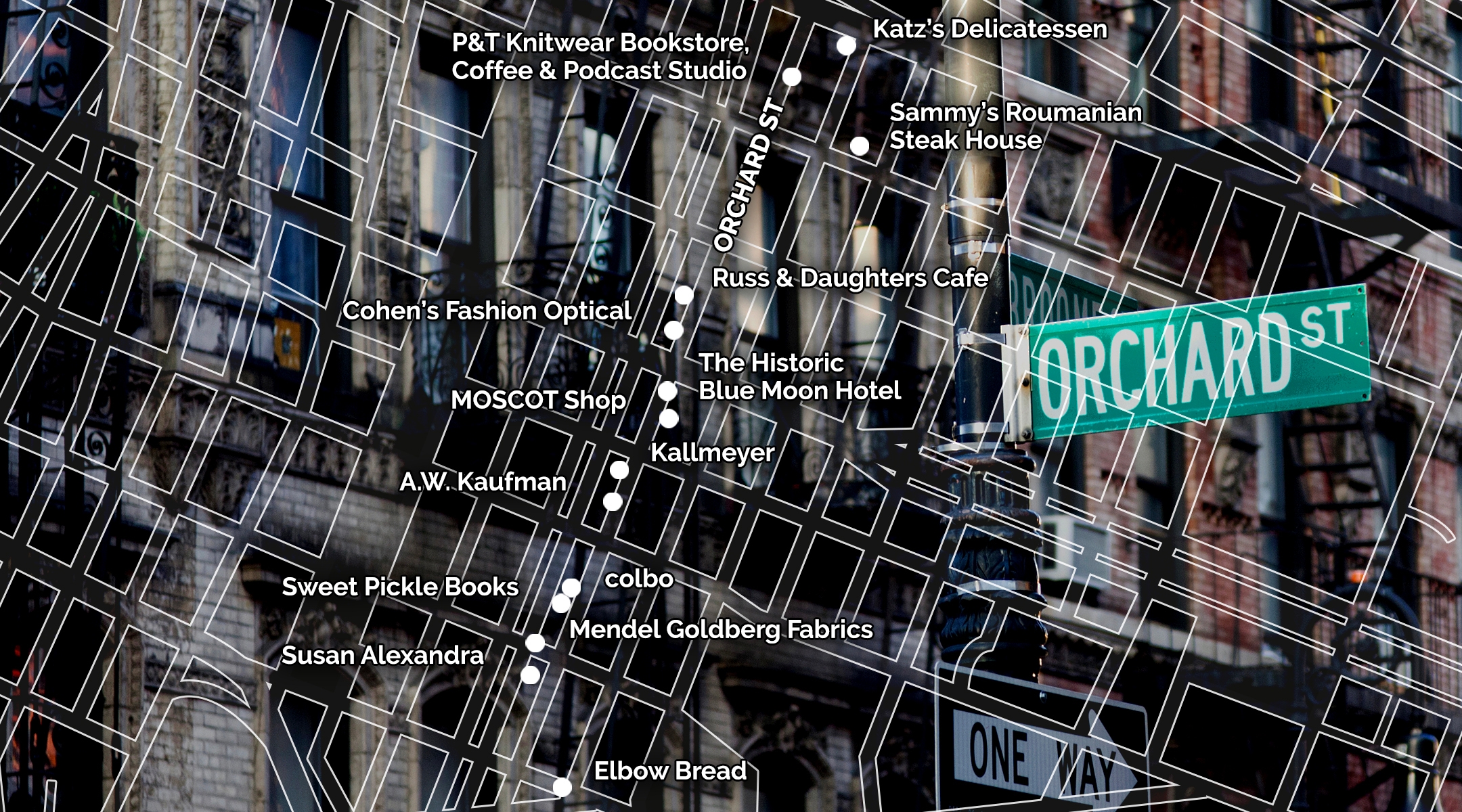For a trip through New York City’s Jewish history and a glimpse of its present and future, there’s no better seven-block stretch than Orchard Street on the Lower East Side.
The neighborhood was once the epicenter of Jewish life in America. Starting with a wave of Jewish immigration from the Russian Empire in the 1880s due to a plague of pogroms after the assassination of the tsar, by 1910 there were an estimated nearly half a million Jews living in the area.
On the teeming streets, Yiddish was commonly spoken and many Eastern European Jews got their start sewing garments in cramped tenement apartments, often shared by multiple families. These immigrants eventually established their own businesses selling clothing, eyeglasses, baked goods, pickles and candy — first via pushcarts, then permanent storefronts.
Orchard Street, in particular, became a hub of Jewish wholesale textile businesses that sold neckwear, hosiery, hats, shoes and more. Exempt from Sunday “blue laws,” Jewish shops thrived on the Lower East Side, where Sunday became the prime shopping day.
“It used to be a street where people both lived and there was commerce — together,” explains Deborah Dash Moore, a professor of American Jewish history at the University of Michigan.
With strict immigration quotas starting in 1924, and with Jewish residents of the Lower East Side able to afford better housing further uptown and in the Bronx and Brooklyn, the Jewish character of the neighborhood began a slow but steady decline. The area remained a magnet for other newly arrived immigrant groups and, since the 1990s, evolved into a trendy, if gentrified, destination.
But today, a new wave of Jewish businesses is stretching out along Orchard Street. From bakeries to bookstores to beaded jewelry, many of these newer establishments reflect the Jewish history of the neighborhood while also offering something fresh.
Here are 16 Jewish businesses on and around Orchard Street — some century-old institutions, some brand new arrivals — that perfectly capture the evolving Jewish character of the Lower East Side, and why you should visit each one.
Elbow Bread
1 Ludlow St.
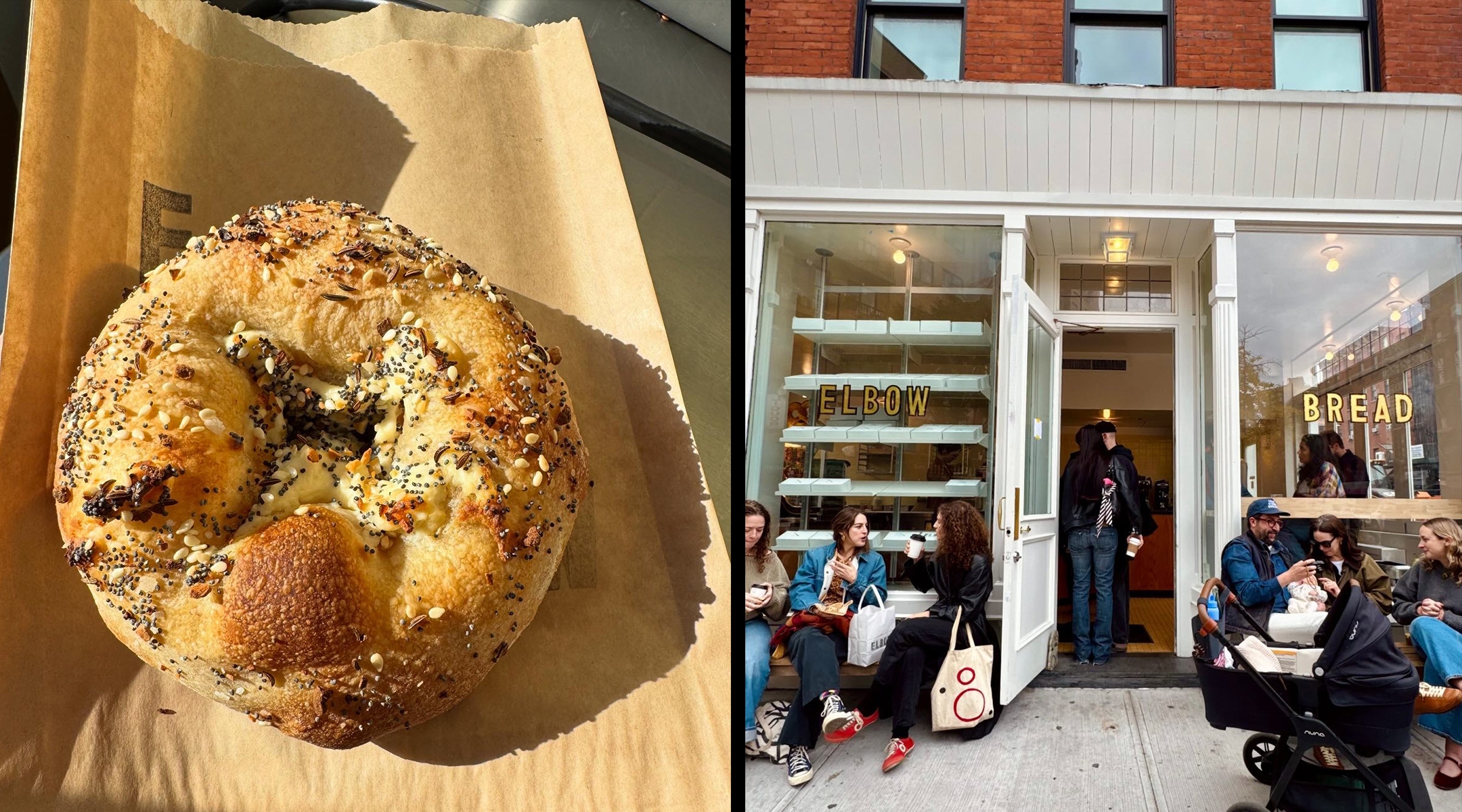
New Lower East Side bakery Elbow Bread takes its inspiration from the neighborhood, making old-school Jewish breads and baked goods like a bialy, left. (Courtesy Elbow Bread)
Just below Canal Street, you can grab a bialy, rugelach or some challah at Elbow Bread, the new bakery from Zoë Kanan, backed by Eric Finkelstein and Matt Ross, the founders of Flatiron’s uber-popular Jewish luncheonette, S&P Lunch. (Yes, the buzzy bakery is technically one block off Orchard Street, on Ludlow Street, but trust us: It’s worth it.)
“There aren’t many Jewish bakeries here anymore,” Kanan told the New York Jewish Week in December. “I saw an opportunity to do something here, in a location with so much Jewish history, and bringing my own personal style to it, which borrows from a lot of different techniques and ingredients. I love the classics and tradition is important, but what I find myself thinking about is ways to reinterpret.”
The schmaltz scallion knot, for example, is a tribute to both neighboring Chinatown and Ratner’s, a now-shuttered Lower East Side dairy restaurant that was famous for its onion rolls.
Susan Alexandra
33 Orchard St.
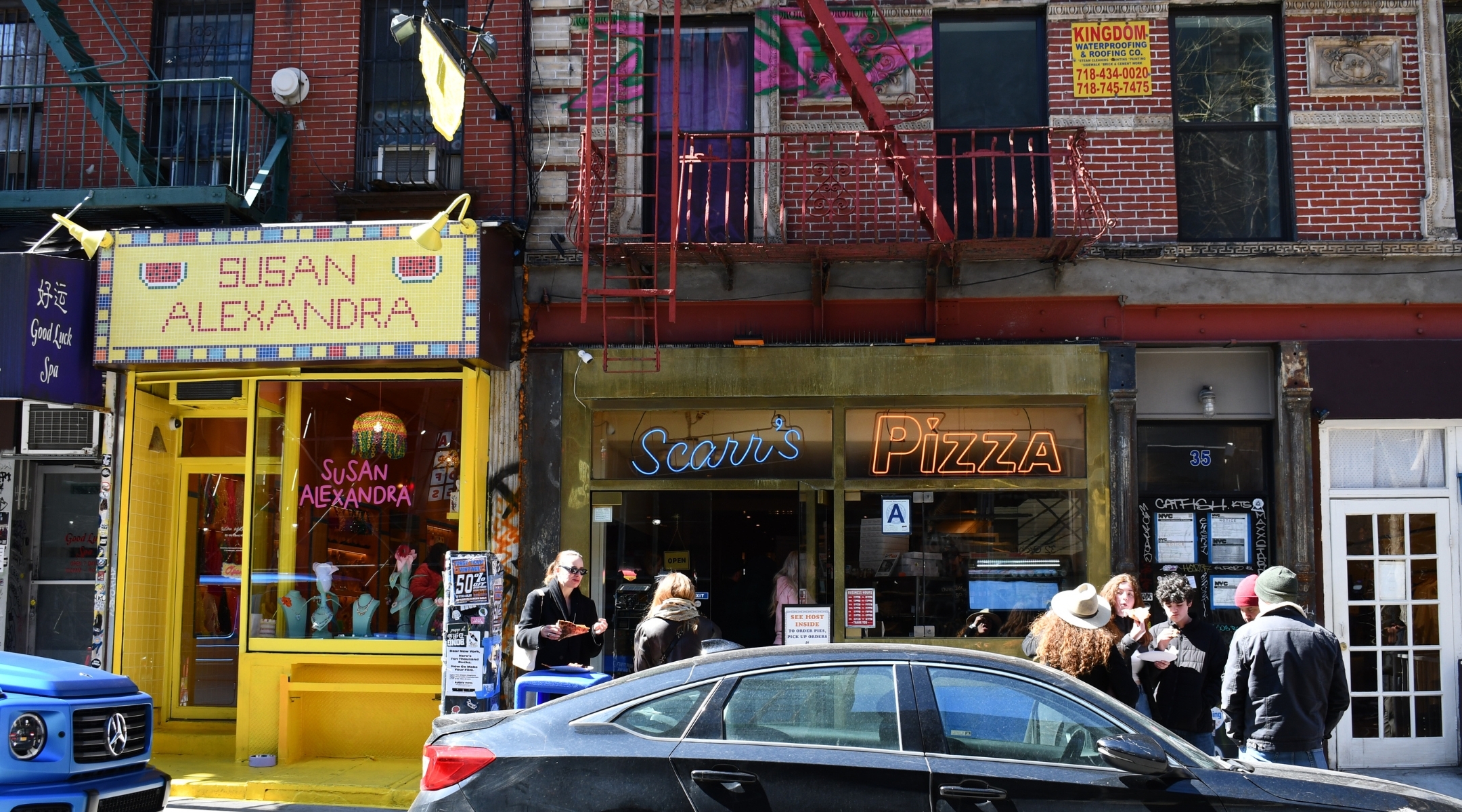
Susan Alexandra jewelry, accessories and apparel heavily features Jewish motifs that pay tribute to the Lower East Side.(Jackie Hajdenberg)
Heading north toward Hester Street, you’ll find the bright yellow storefront belonging to jewelry and accessory store Susan Alexandra, a brand founded by Jewish designer Susan Korn. For Korn, whose handmade, beaded accessories are popular among celebrities and the fashion-forward, opening a storefront on Orchard Street in 2021 was all about the neighborhood’s history.
“It had to be Orchard Street — for me, that’s just the street,” Korn told us that year. “It’s really, really special to me that we’re able to have a store exactly where so many of my ancestors set up shop.”
Since opening, Korn took a personal interest in the history of her building, which at one point included three storefronts simultaneously: B. Selevan, a wholesale notions and gloves store; M. Katz Suspenders, Garters and Belts, and Brody Brothers Hosiery.
“It’s just cool that the store has seen so much,” Korn said in a recent interview. “I like the idea that it was somebody’s dream, somebody who was likely a Jewish person, was the first person to be there. And it’s really special that each store on the street, or each place on the street, has such an interesting history.”
But Korn said the present-day community is pretty special, too. “You kind of pop into enough places and introduce yourself, and you’re like, ‘I’m Susan, I opened down the block,’ and you get to meet people,” she said. “There’s a sense of community.”
Mendel Goldberg Fabrics
72 Hester St.
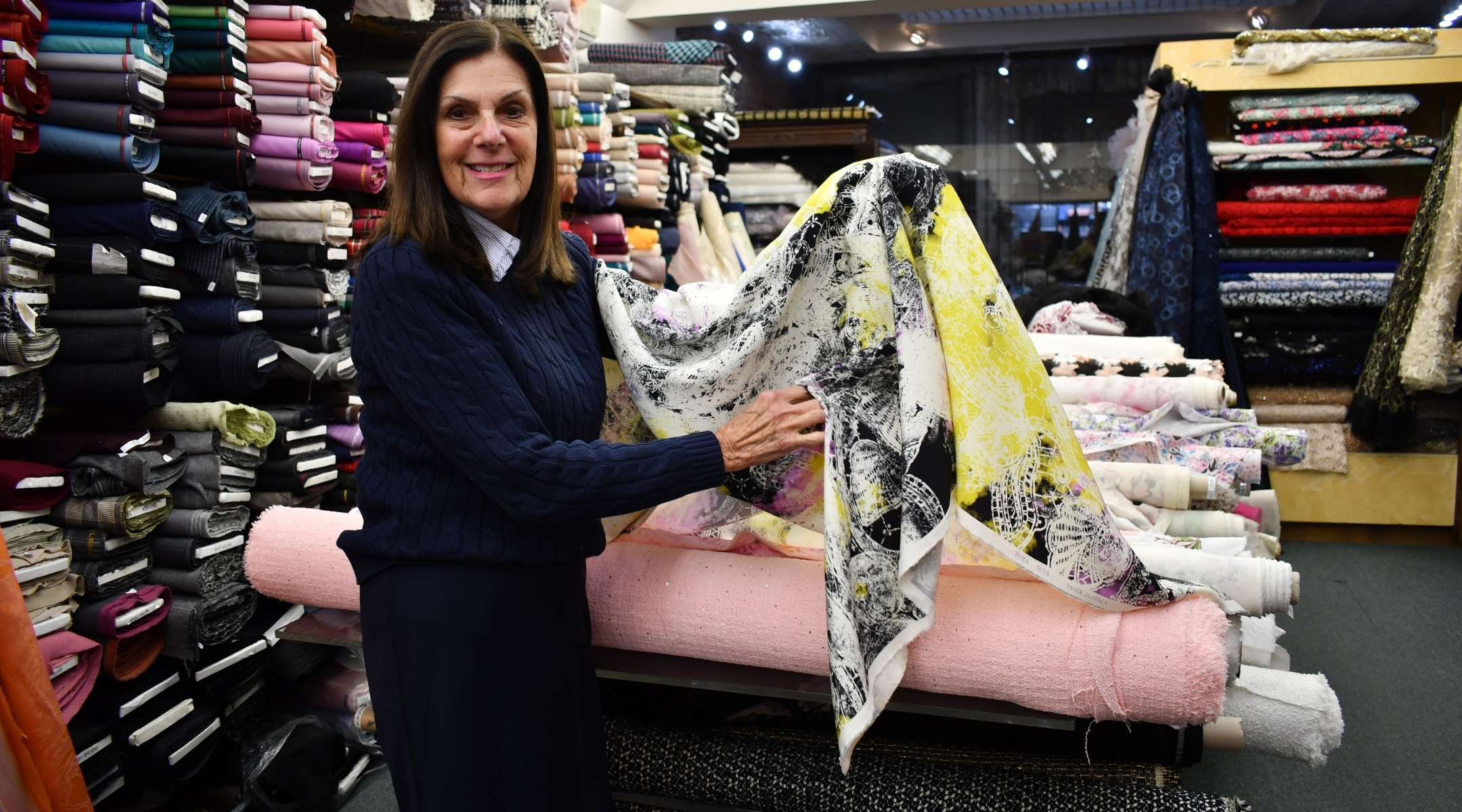
Alice Goldberg Wildes is the third generation of her family to run Mendel Goldberg Fabrics on the Lower East Side. (Jackie Hajdenberg)
At the corner of Orchard and Hester Streets you’ll find Mendel Goldberg Fabrics, a fabric store that’s been run by the same Jewish family since 1890. It’s one of the few businesses to stick around the neighborhood for more than 100 years.
“The new and the old blend beautifully, which I think is critical to any neighborhood,” fourth-generation owner Alice Goldberg Wildes said of the Lower East Side. “I think that’s critical, that the older generation helps the newer generation.”
Over the decades, the shop has expanded its inventory from threads and tailoring supplies to silks and other high-end fabrics. “The store is completely different now, because every generation did something different in this business,” Goldberg Wildes, who grew up watching her father at the store, told the New York Jewish Week in 2023. “Mendel was selling thread from a pushcart. Alexander, his son, started selling silks and other tailoring supplies to the fur trade. My father, Samuel, was selling to Macy’s and Gimbels, who at that point had large fabric departments in New York, as well as starting to import from Europe.”
Today, under Goldberg Wildes’ direction, the store specializes in high-end fabrics, and its customers include Broadway and television costume designers. But some things remain the same: Like previous generations of her family did, the store is closed on Shabbat and Jewish holidays, and fabrics are also checked for shatnez, or mixes of wool and linen that are forbidden according to Jewish law.
Shtick NYC
(Coming this spring to Orchard between Hester and Allen)
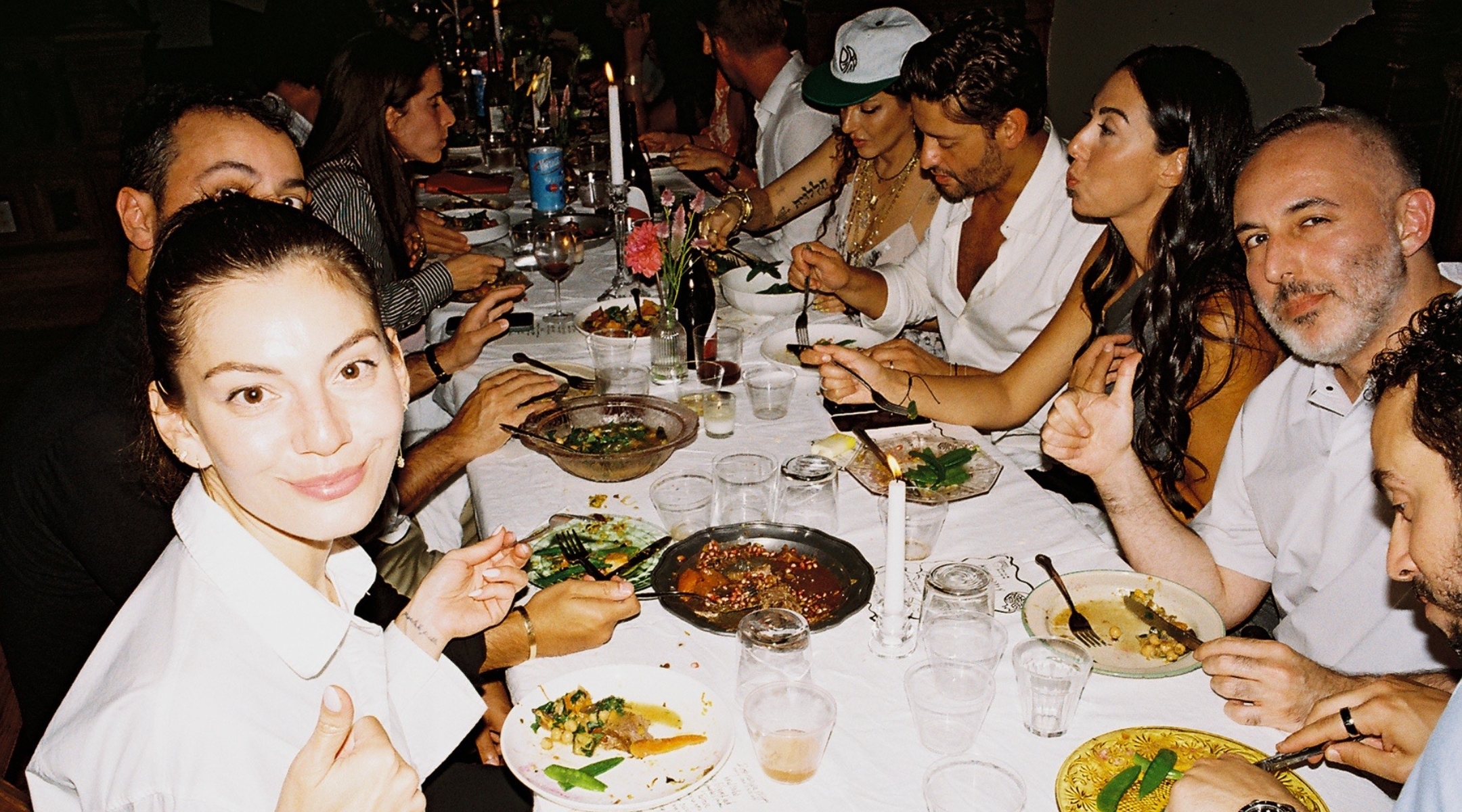
Guests nosh at a Shtick Shabbat dinner. (Courtesy Jacqueline Lobel)
After a three-year run as a popup dinner series, Jacqueline Lobel’s Shtick NYC is opening a brick-and-mortar spot for her Shabbat and holiday dinners at the corner of Hester Street and Orchard Street.
“We need more cool Jewish spaces,” Lobel told the New York Jewish Week in February.
Her forthcoming venue is “equal parts for Jews and non-Jews,” she said. “We’ll be offering weekly Shabbat dinners to the public. We’ll also be available as just a space for people who need a venue for something and want to collaborate. It’s exciting to plant the flag back in the old Jewish shtetl.”
Sweet Pickle Books
47 Orchard St.
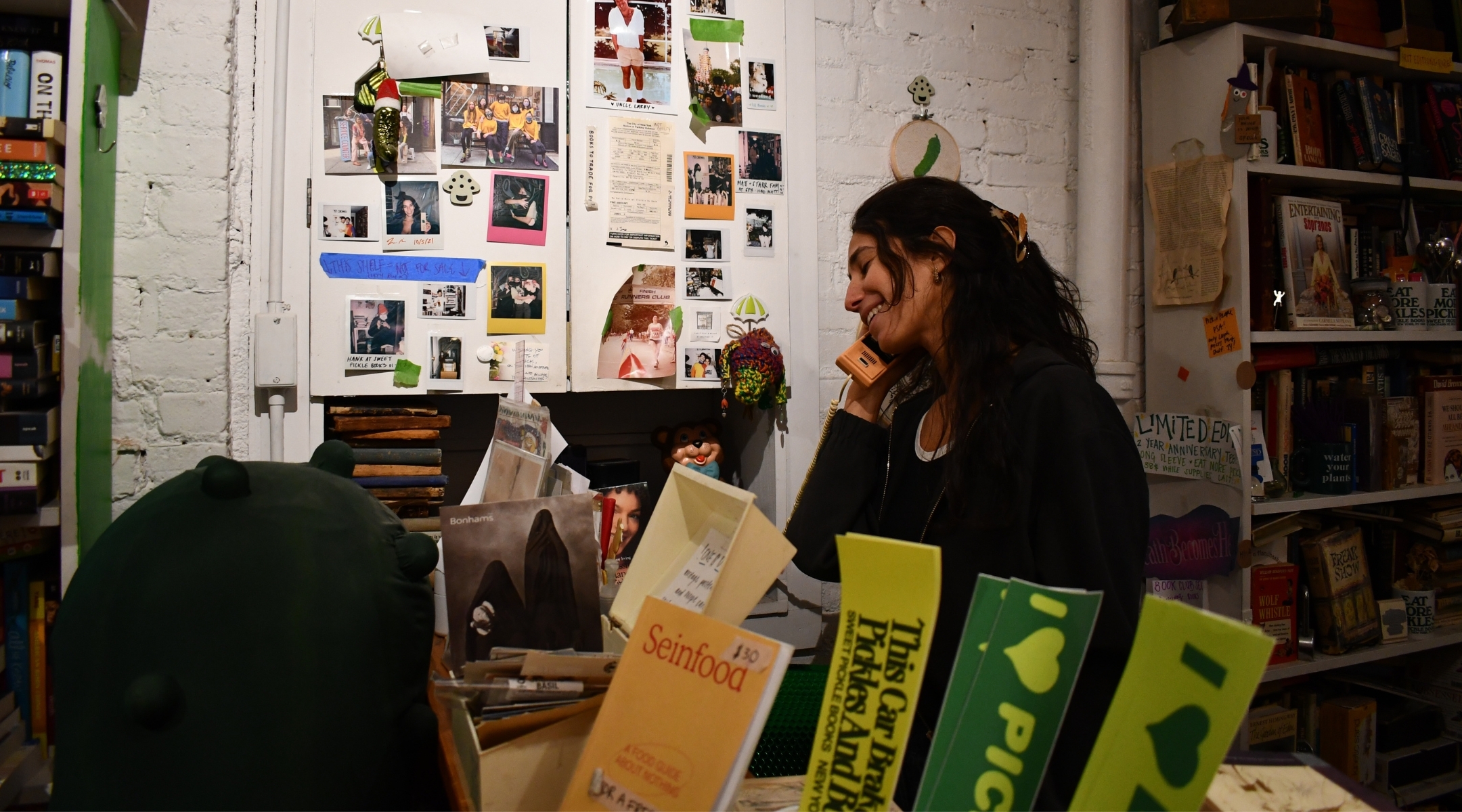
Leigh Altshuler, owner of Sweet Pickle Books, takes a call inside the books-and-pickles store. (Jackie Hajdenberg)
At Sweet Pickle Books, which opened in 2020, you can shop for used books or pickles — or both. Customers can trade used books for pickles, or simply buy a jar (from $9.50).
Owner Leigh Altshuler came up with the concept during the Covid pandemic. “I wanted it to be something that was an homage to the neighborhood and its history and my Jewish heritage,” Altshuler said at the time. “And so from there, pickles.”
Among the store’s crowded shelves you’ll find plenty of books about Judaism and finding God, as well as novels, essay collections and poetry, as well as various Jewish tchotchkes like a still-in-its-plastic-wrap Yiddish workout tape (not for sale); photos from Altshuler’s bat mitzvah; and Fran Drescher’s biography.
“It’s such a community neighborhood. It definitely still has that feel. I know my neighbors,” Altshuler said.
“I don’t go to temple regularly, I don’t do Shabbat, but I definitely have found a new sense of belonging,” she added in a recent interview.
Colbo
51 Orchard St.
“Colbo” comes from the Hebrew for “everything in it,” and this Orchard Street café, record store and upscale clothing brand lives up to its name.
Founded in 2021 by Israeli entrepreneur and designer Tal Silberstein, Colbo operates as a full-service café and shop during the week. On the weekends, it also hosts popup events with “a range of designers, artists, chefs, DJs, and other creative friends,” featuring food, wine, and music, according to its website. What’s more, the narrow and pedestrian-friendly nature of Orchard Street often lends itself to Colbo’s hangouts spilling out into the street.
A. W. Kaufman
73 Orchard St.
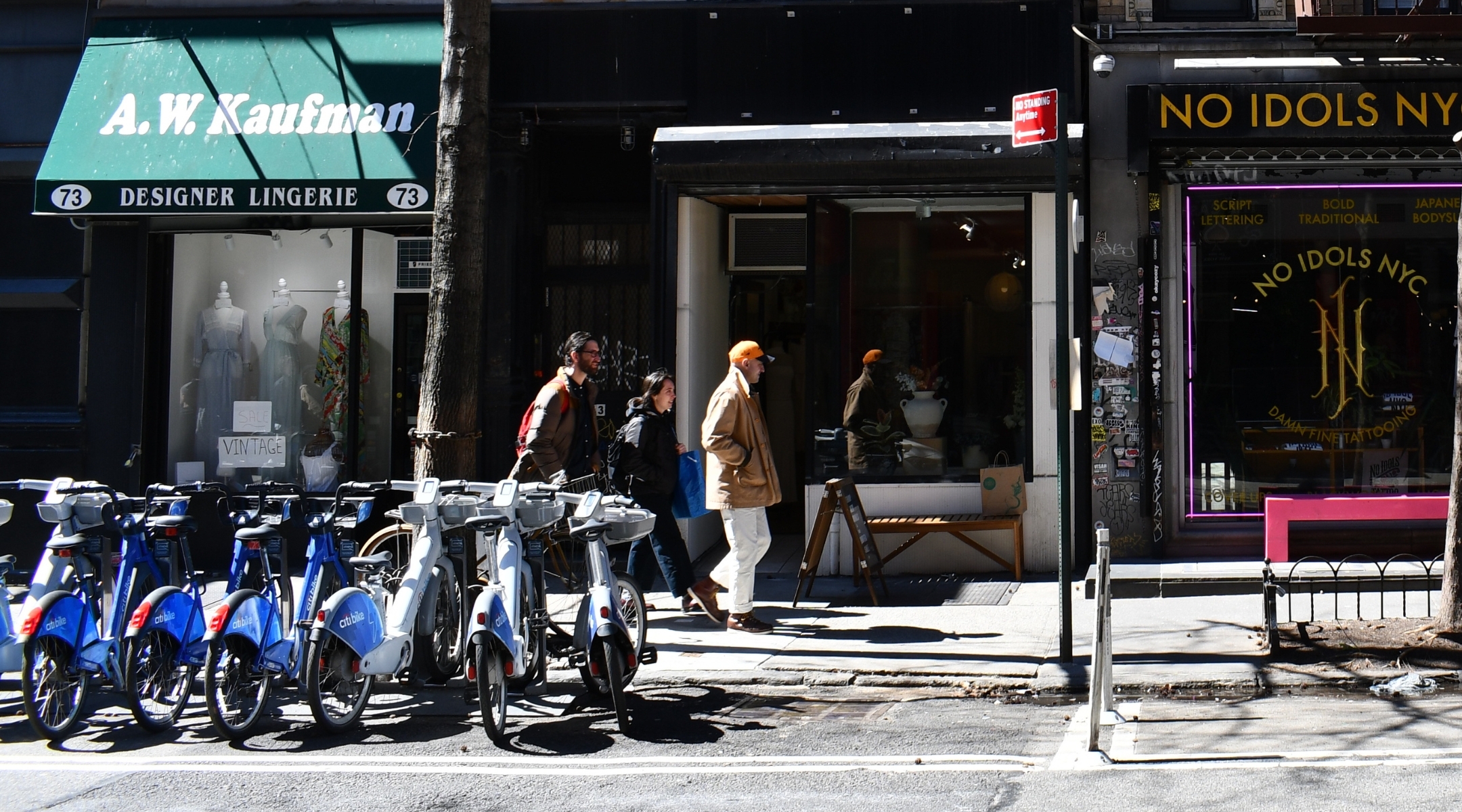
Designer lingerie shop A.W. Kaufman has been in the family since 1924. (Jackie Hajdenberg)
Another old-school spot, this designer lingerie shop has been open on the Lower East Side since 1924. Current owner Miriam Kohn is the third generation of her family to operate the shop, which sells high-end undergarments and sleepwear. With clear plastic boxes full of imported luxury lingerie from brands like Christian Dior, Wolford and Oscar de la Renta stacked to the ceiling, this no-frills spot has been a neighborhood standby for over a century.
Regina and Abraham Kaufman, Kohn’s grandparents on her mother’s side, were Jewish immigrants from Hungary, opening the store’s first location on Delancey, and later on Orchard. The block where A.W. Kaufman currently exists was formerly surrounded by hosiery, lingerie and undergarment stores, but today it’s one of only two remaining undergarment stores on Orchard Street.
Drop by and you might witness a modern miracle: Rumor has it that Miriam Kohn can tell you your bra size just by looking at you.
Kallmeyer
83 Orchard St.
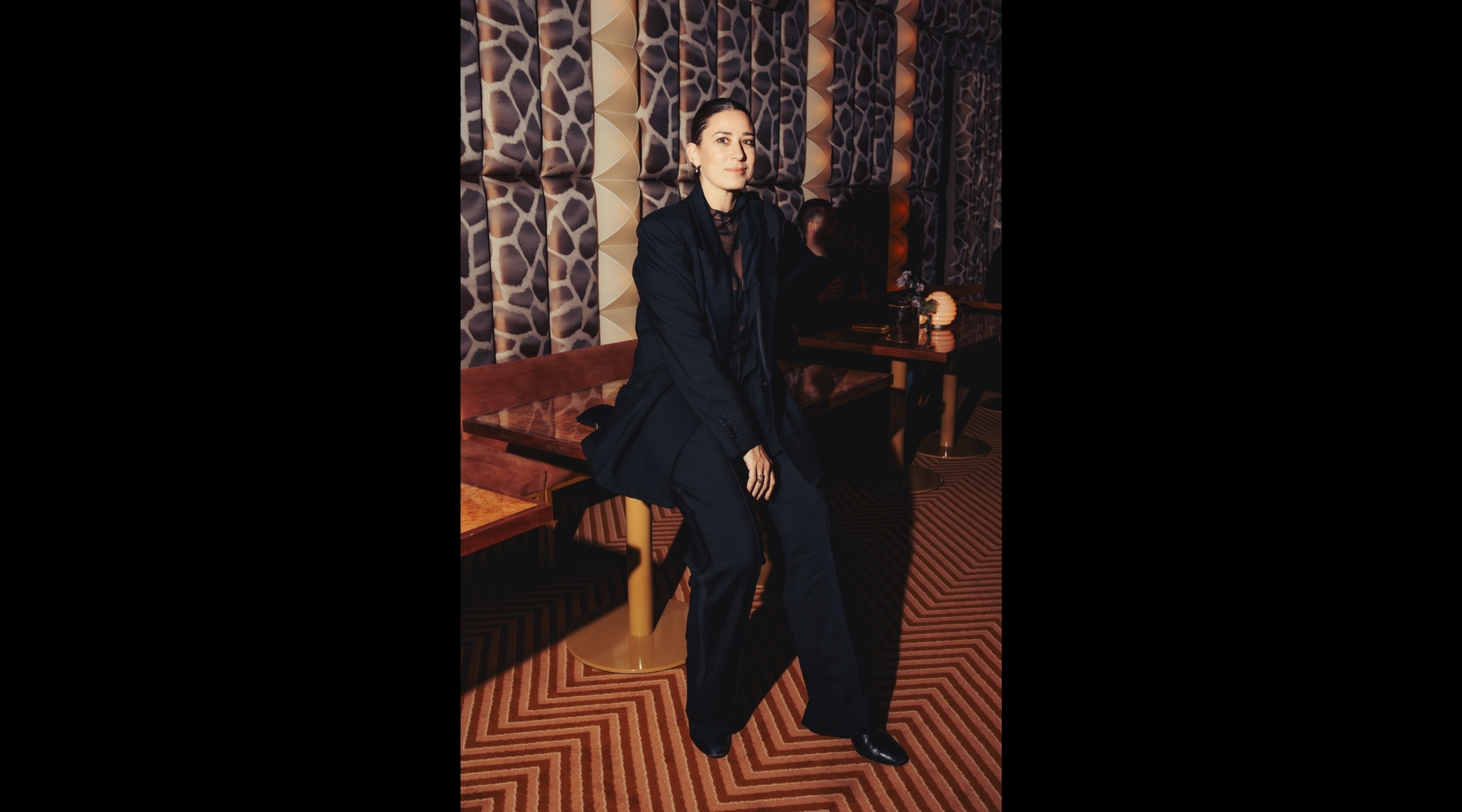
Daniella Kallmeyer launched her label in 2012 and opened up her shop on Orchard Street in 2019. (Amir Hamja for The Washington Post via Getty Images)
Daniella Kallmeyer is the designer behind her eponymous luxury womenswear brand. She’s a Jewish immigrant from South Africa who launched her label in New York in 2012, and later opened a shop on Orchard Street in 2019.
While Kallmeyer said she felt a magnetic pull to Orchard, she doesn’t attribute it to the area’s rich Jewish history. Instead, she credits Jewish geography: After graduating from Syracuse University in 2006, Kallmeyer moved into her grandmother’s old apartment in Riverdale, where her next-door neighbor was the daughter of Alice Goldberg Wildes of Mendel Goldberg Fabrics.
“I bought my fabrics for my very, very, very first collection — before it was even commercial — my first collection from Mendel Goldberg,” Kallmeyer said.
Later this spring, Kallmeyer is set to open another storefront — this one on upscale Madison Avenue. “I’m a young, queer, Jewish woman who is a completely self-funded business, and kind of rubbed two cents together to open my store, and I literally hawked schmattes to go from profit to profit until I could build my business big enough to go from one step to the other,” she said, using the Yiddish word for items of clothing.
Kallmeyer credits her Orchard Street shop with establishing a “life of its own” for her brand, saying, “It’s, like, literally the American Dream story.”
Moscot
94 Orchard St.
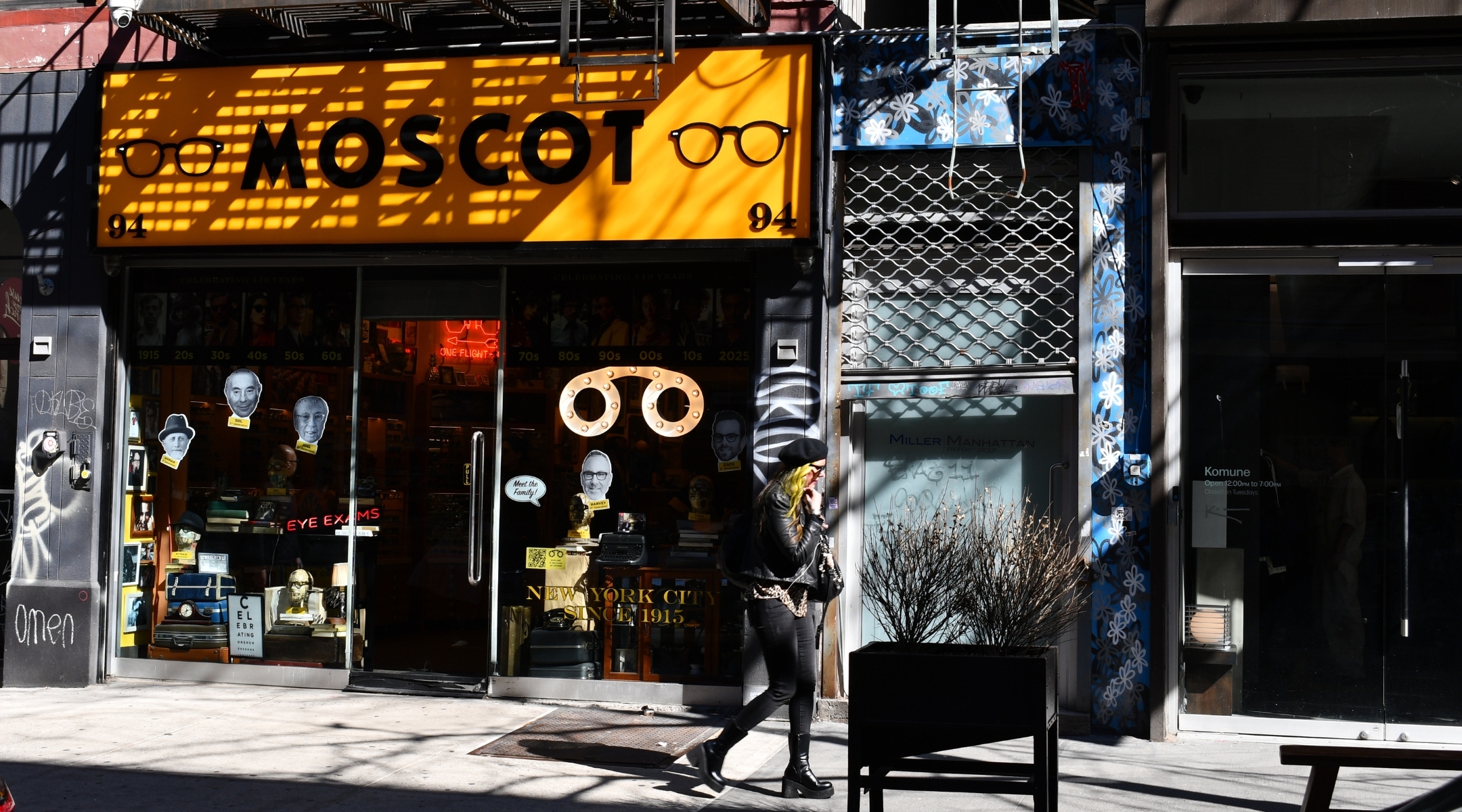
Moscot is in its fifth generation of family operations and known for its Yiddish-sounding product names. (Jackie Hajdenberg)
If you’ve ever popped into one of Moscot’s more than 20 eyeglass store locations around the world, you may have noticed some of their products have Yiddish names, like “Maydela,” “Shmooz” and “Shtarker.”
Moscot was originally founded as a pushcart by Hyman Mushcot (later Moscot). The eyewear brand moved into a storefront at 118 Orchard St. in 1915. The shop was once the neighborhood rival of the original Cohen’s Fashion Optical, which also maintains a Lower East Side location on Orchard and Delancey. Today, Moscot sells only its own brand of eyewear, whereas Cohen’s sells other brands.
Moscot, which is in its fifth generation of family leadership, purchased and moved into its current location at 94 Orchard St. in 2021. “Our DNA is here on Orchard Street,” Zack Moscot, Moscot’s chief design officer, told Forbes.
Historic Blue Moon Hotel, Sweet Dreams Café and Settembrini Trattoria
100 Orchard St.
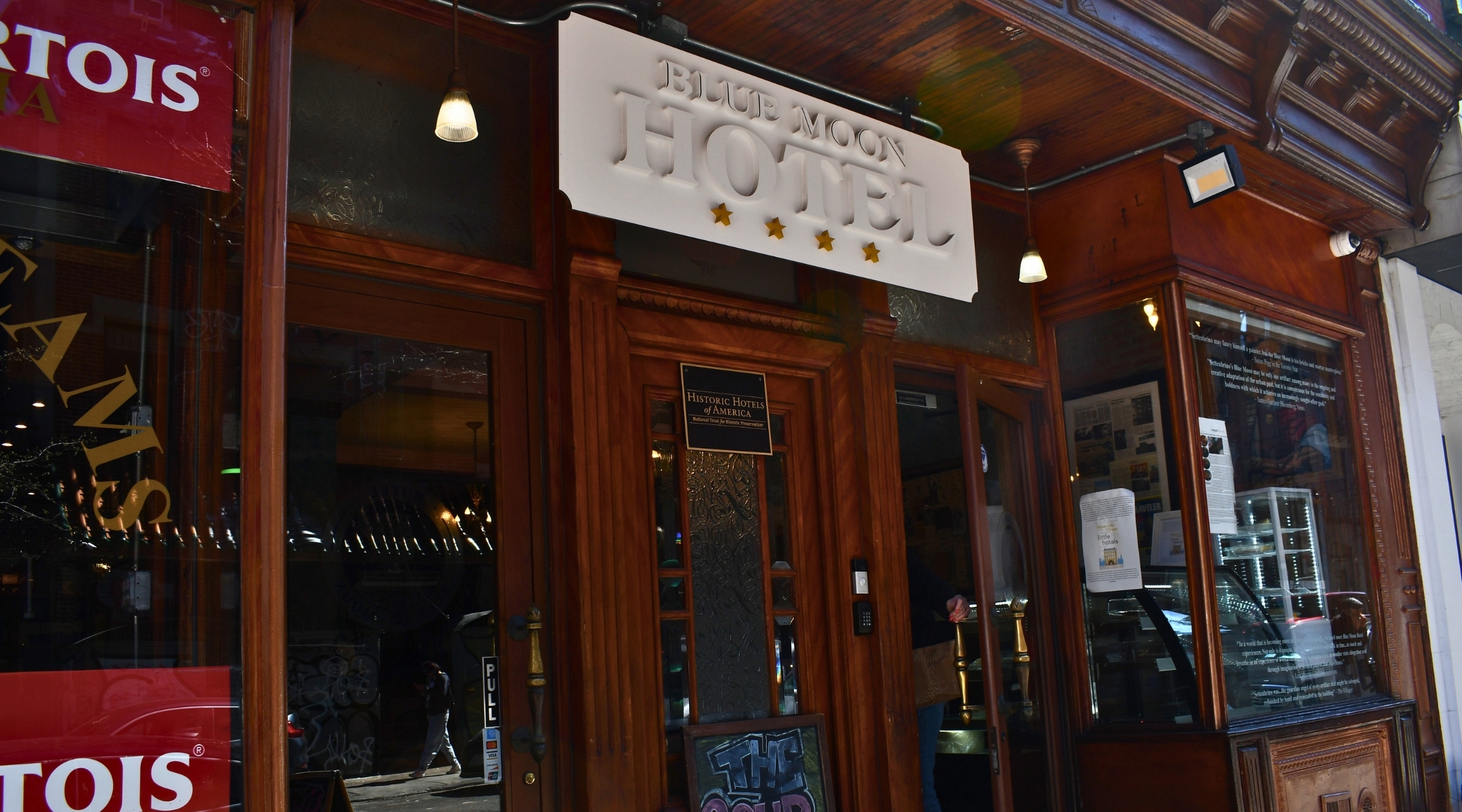
The Historic Blue Moon Hotel is also home of two kosher establishments: Sweet Dreams Café and Settembrini Trattoria. (Jackie Hajdenberg)
The Historic Blue Moon Hotel was built as a tenement building 1879, and is the second-oldest building on its block.
After a five-year renovation, the boutique hotel was opened in 2006 by Randy Settenbrino, an Orthodox Jewish artist who grew up in Crown Heights, Brooklyn. (Settenbrino’s father was Italian and his mother, a Russian Jew; for decades, the Italian side of his family ran Brooklyn’s Vesuvio Restaurant.)
The building has been updated and decorated to honor the neighborhood’s erstwhile Jewish character. Its hallways are decorated with collages of Jewish ephemera and personal effects, from a schoolboy’s Yiddish homework to posters for Yiddish theater.
“We are dedicated to Jewish community in every way that we can be,” Settenbrino told us last summer while enjoying the views of Orchard Street from the top-floor balcony of the Molly Picon Room, named for the star of Yiddish stage and screen.
The hotel boasts a kosher dairy Italian bakery and trattoria on site — the latter of which offers cooking classes — and also features a colorful mural showing 2,000 years of tragedies that have befallen the Jewish people.
The Tenement Museum
103 Orchard St.
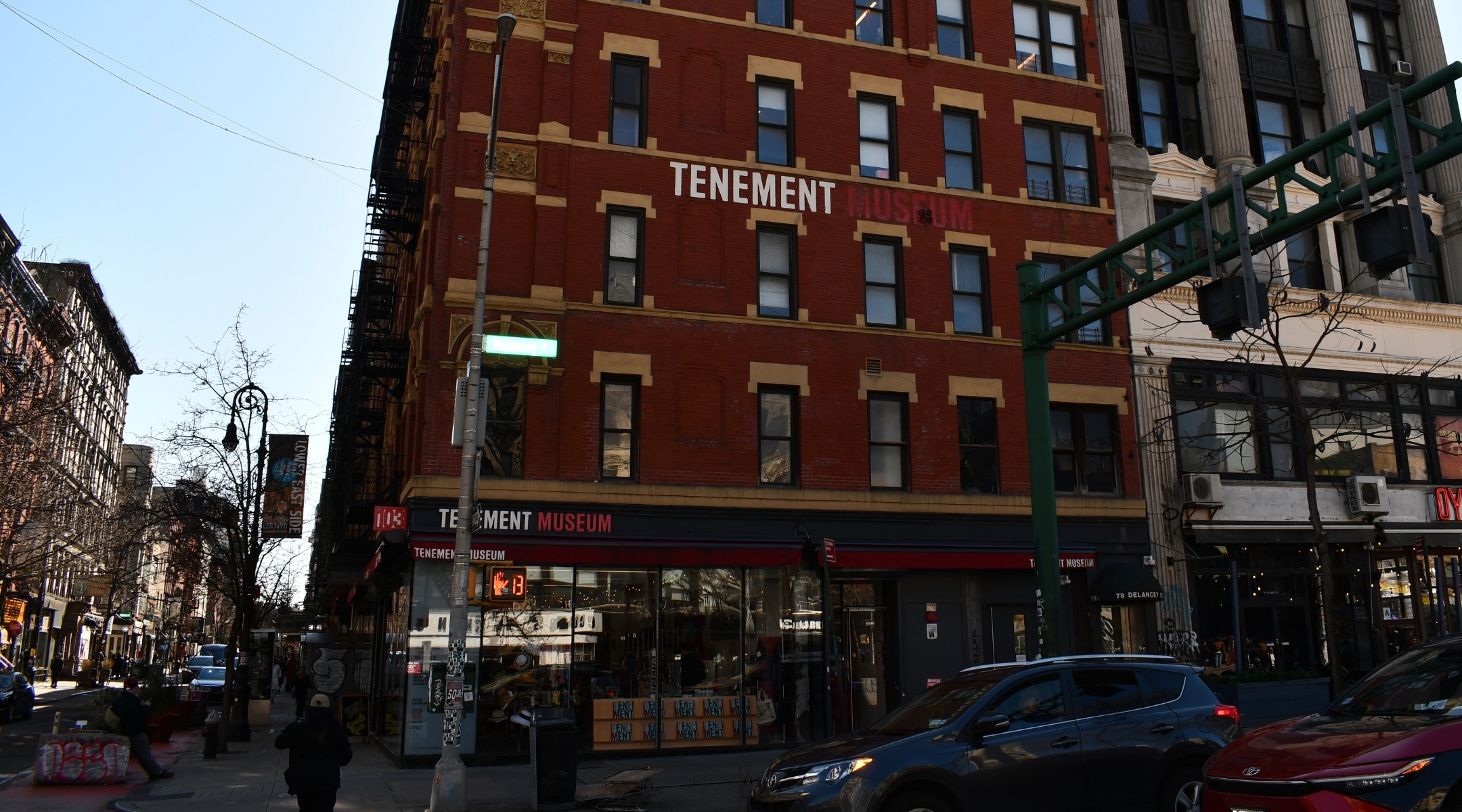
The Tenement Museum has been a fixture of the Lower East Side for decades. (Jackie Hajdenberg)
While not explicitly a Jewish business, the Tenement Museum is considered a must-see spot for visitors to the Lower East Side. It’s a living history museum that shows how New York’s immigrant communities throughout the 19th and early 20th centuries thrived in the neighborhood.
Among the tenement apartments available to tour are those of the Levine family, who arrived from the Russian Empire in 1890 in an early wave of Jewish immigration; the Confino family, Sephardic Jews who came from Greece in 1913; and Holocaust survivors Kalman and Rivka Epstein, who immigrated to New York in 1947.
The Tenement Museum is made up of two buildings at 97 Orchard (constructed in 1863) and 103 Orchard (built in 1888) and underwent a renovation in 2023 that includes a new exhibit showcasing the lives and home of Joseph and Rachel Moore, a Black couple living in New York at 97 Orchard St. in 1869.
The original Cohen’s Fashion Optical
117 Orchard St.
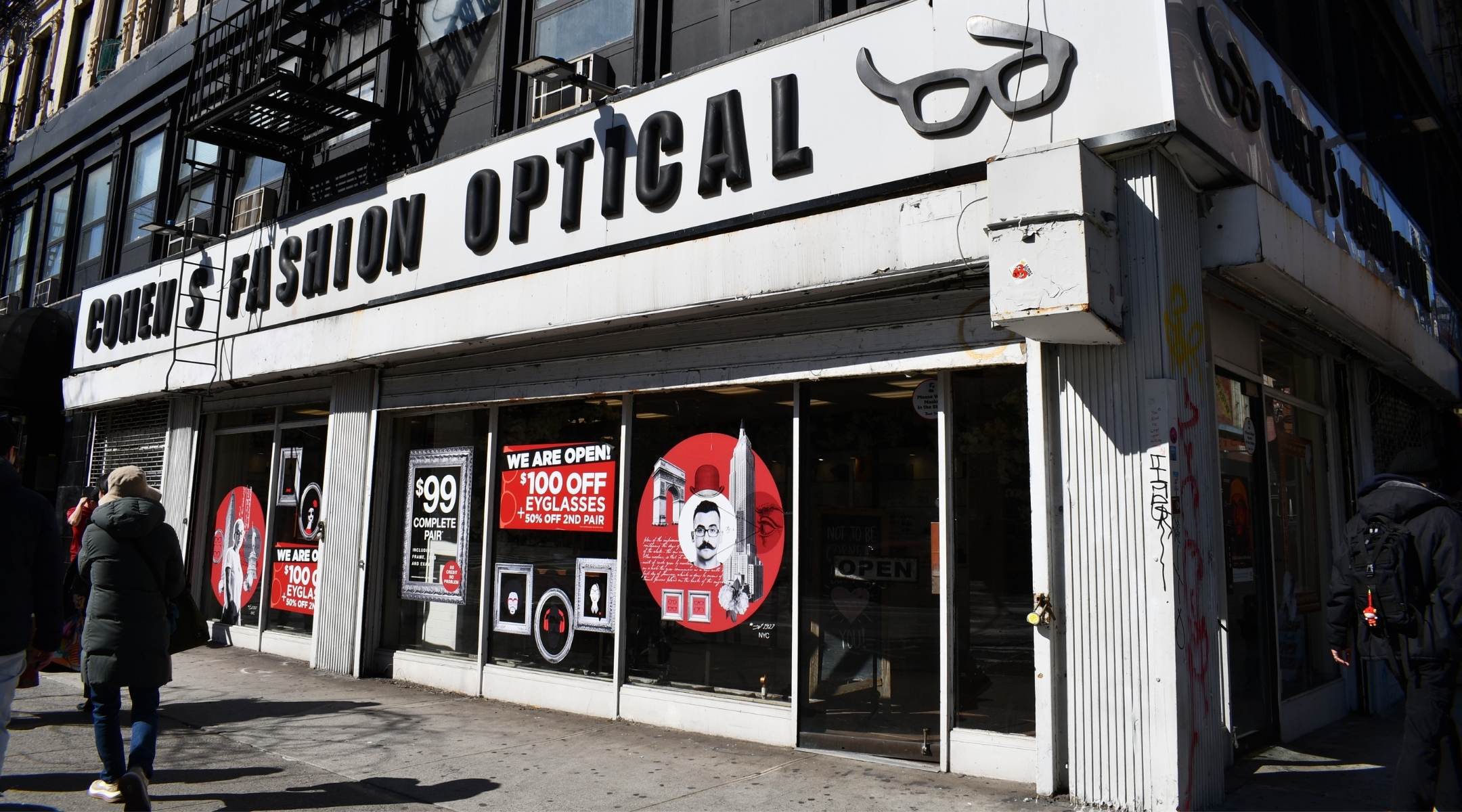
Cohen’s Fashion Optical on Delancey and Orchard began as a pushcart and is now a national chain with over 100 locations. (Jackie Hajdenberg)
Need glasses? Good news: Here’s another spot to grab a new pair.
Like Moscot, national eyeglass brand Cohen’s Fashion Optical also began on Orchard Street, — the two stores were business rivals in their early days, literally hawking their wares across the street from each other. Founded in 1927 by Jack Cohen, Cohen’s Fashion Optical began as a pushcart before settling into the flagship’s current storefront, where it has operated for nearly 100 years.
Jack Cohen’s vision — no pun intended — was to offer fashionable glasses, and Cohen’s purportedly became the first store in the city to offer fashionable, hand-dyed eyeglass frames, changing the public’s understanding of what glasses could look like.
Russ & Daughters Café
127 Orchard St.
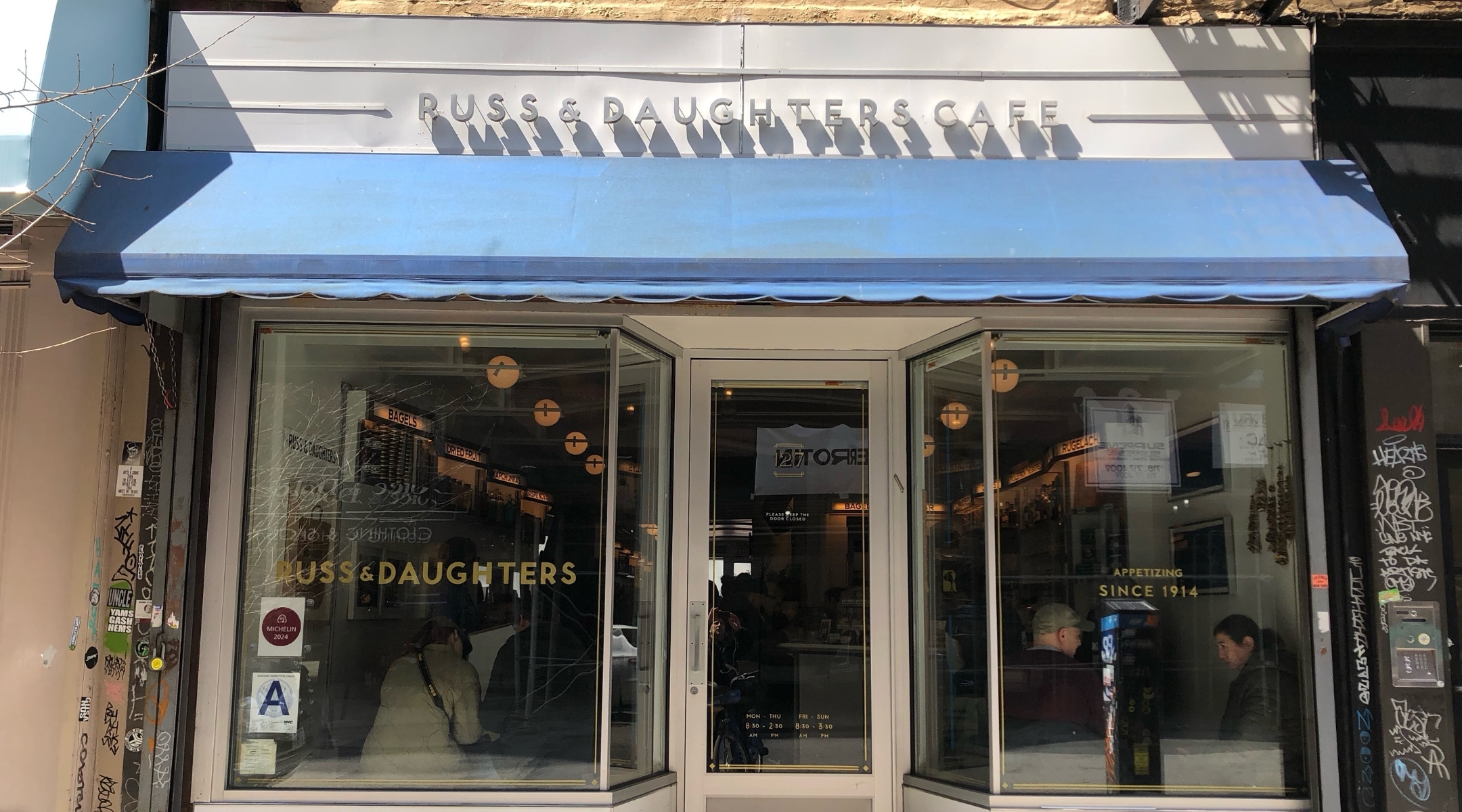
Russ and Daughters opened up their first sit-down restaurant on Orchard Street in 2014. (Julian Voloj)
Specializing in smoked fish, Russ & Daughters Café opened on Orchard Street in 2014, in honor of the 100th anniversary of Houston Street’s iconic appetizing spot, Russ & Daughters — the first business in the United States to have “& Daughters” as part of its name.
Named for founder Joel Russ and his three daughters Hattie, Ida and Anne, Russ & Daughters (which includes the original location, the Orchard Street cafe and outposts in Hudson Yards and Brooklyn’s Navy Yard) is today run by fourth-generation owners and cousins Josh Russ Tupper and Niki Russ Federman.
The cafe is the business’ first sit-down restaurant, with items like a herring plate ($24), a lox, eggs and onion scramble ($23) and pastrami-cured salmon on a mini pretzel bagel ($16).
Russ & Daughters Café doesn’t take reservations and does not do takeout. Be prepared to wait — but it’s worth it!
Sammy’s Roumanian
112 Stanton St.
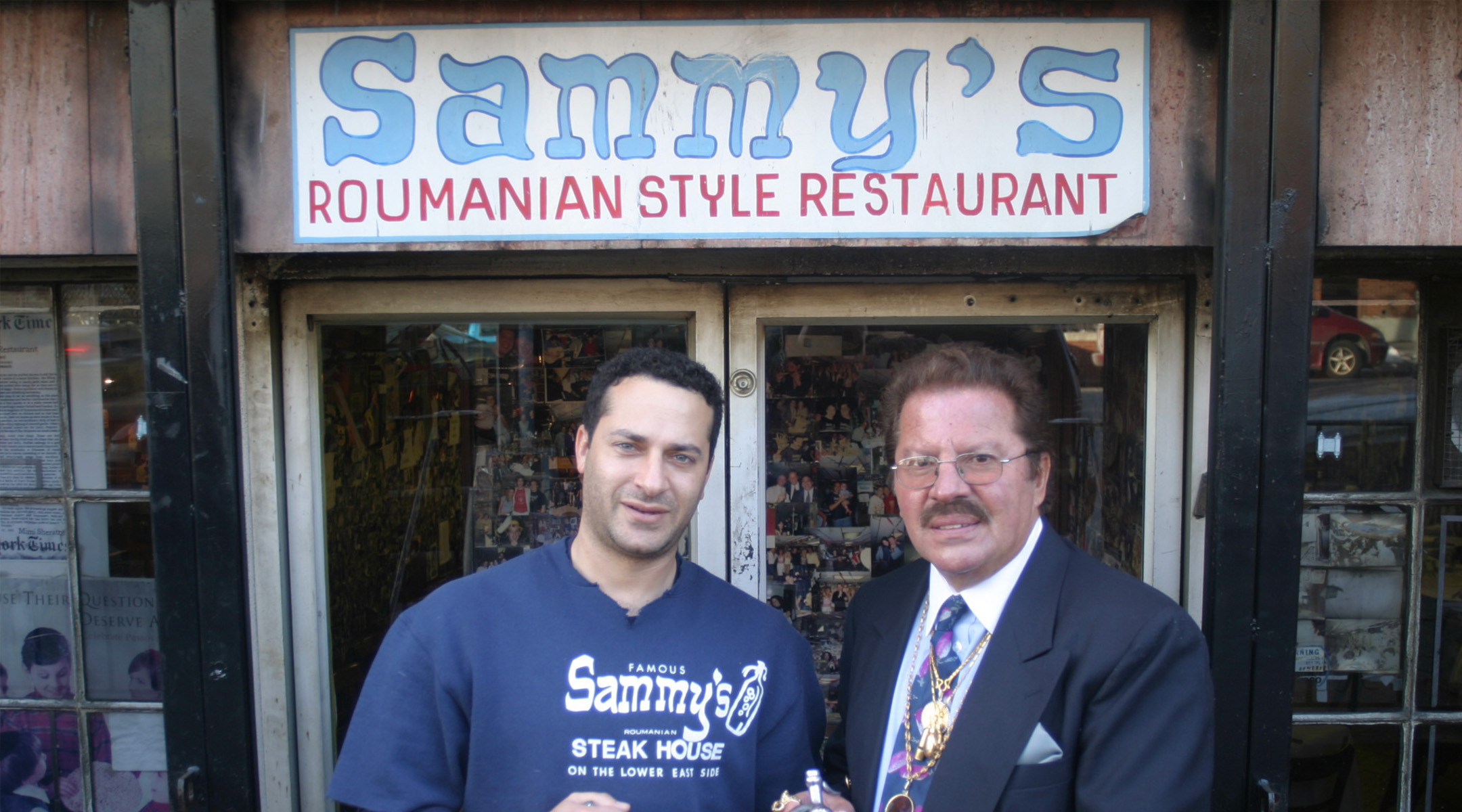
Sammy’s Roumanian Steakhouse owners David, left, and Stan Zimmerman, outside their restaurant’s original location at 157 Chrystie St. in 2005. (Julian Voloj)
For nearly 50 years, Sammy’s Roumanian Steakhouse — famous for its carafes of schmaltz, icy bottles of vodka and rich chopped liver prepared tableside — operated out of a lovingly described “dark and dingy” basement on Chrystie Street, “where every night was a bar mitzvah” thanks to shtick served up by in-house entertainer Dani Luv.
New Yorkers mourned when Sammy’s abruptly closed its doors in 2021. Then last year, Sammy’s reopened with a Passover seder in a brand-new location not far from Orchard Street at 112 Stanton St.
“We’re back on the Lower East Side,” second-generation owner David Zimmerman told us at the time. “We’re one block away from Katz’s, and you’ve got Russ & Daughters and you’ve got Yonah Schimmel’s.” (Yonah Schimmel’s Knish Bakery is a few blocks off Orchard, at 137 E. Houston St.)
Other than the street-level location, everything about the new Sammy’s Roumanian is the same as the old: the menu, the photos and business cards that adorn the walls, and the nightly music stylings of Dani Luv.
P&T Knitwear
180 Orchard St.

An exterior view of P&T Knitwear, an Orchard Street store that does not sell knits, but rather books and coffee and offers podcast recording and meeting space. (Jackie Hajdenberg)
You won’t find any cardigans or scarves at P&T Knitwear. Instead, you’ll find a one-of-a-kind New York City-centric bookstore that’s also a coffee shop, a podcast recording studio and an event space with amphitheater-style seating for 80.
Opened by venture capitalist and corporate “fixer” Bradley Tusk in 2022, the shop is named for the Lower East Side knitwear business once run by Tusk’s grandfather, Hymie Tusk, and his friend, fellow Jewish immigrant and Holocaust survivor Mike Pudlo (P&T comes from the two men’s last names).
Reusing the name, Tusk told us last year, was a way to honor his grandfather’s legacy. And he chose the downtown location because he had lived in the East Village for “years and years and years,” and like so many New Yorkers, still mourned the loss of the St. Mark’s Bookstore.
Today’s P&T Knitwear operates as a “a philanthropic community resource” and not a business in a traditional sense.
“The notion of being able to go from being refugees with no money to being able to open up a store with the same name a block over, and knowingly lose money every single year because we care about it, is a testament to the opportunities that this country provides,” Tusk said in his store in March.
Katz’s Delicatessen
205 E. Houston St.
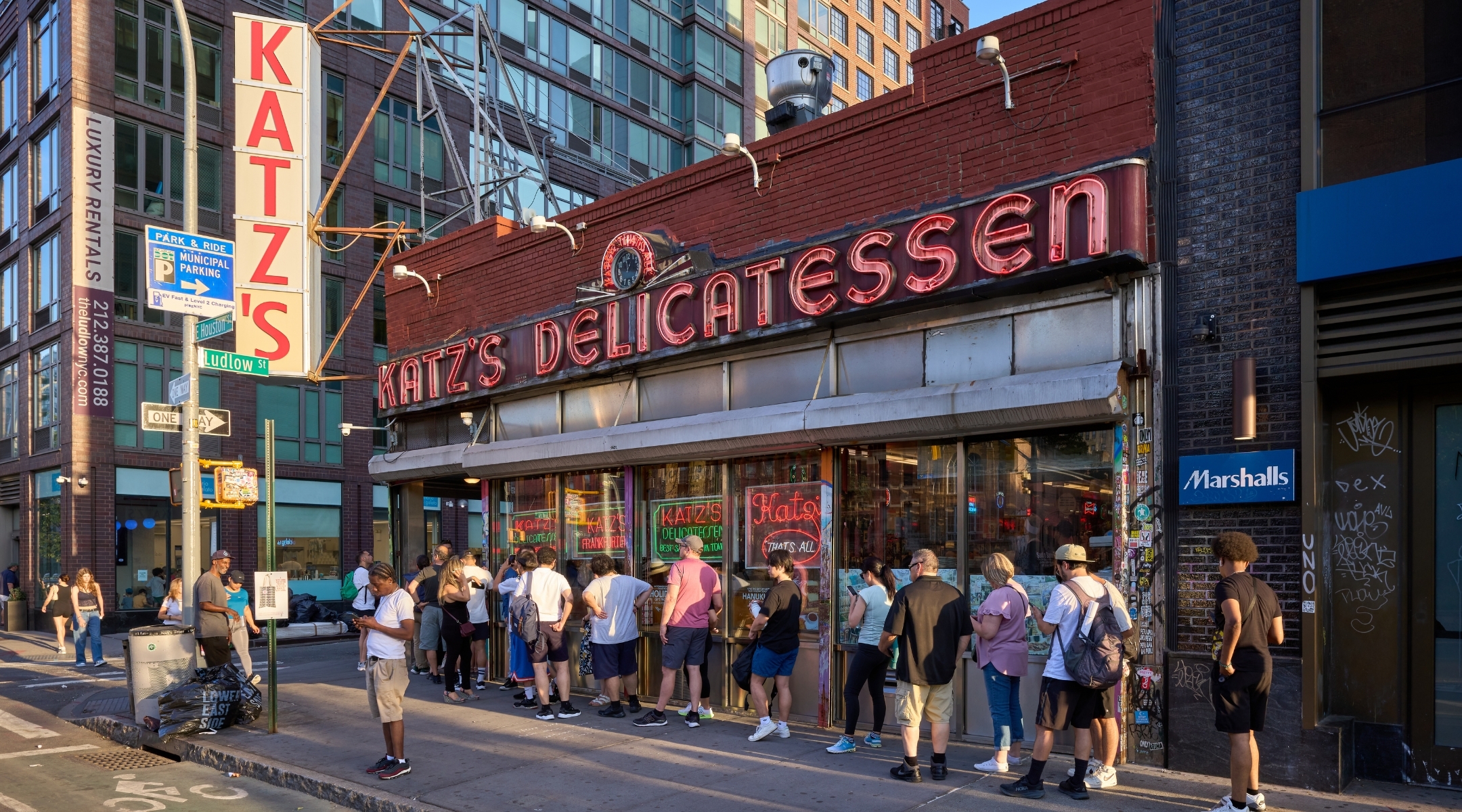
Katz’s Deli is a fixture of the Lower East Side. (Frank Schulenburg via Wikimedia)
Katz’s is a classic for a reason. No visit to the Lower East Side is complete without a stop at this iconic, family-owned institution whose roots date to 1888. Located one block off Orchard Street, at the corner of Houston and Ludlow Streets, you can enjoy a classic pastrami on rye — which the New York Times considers a sandwich that “defines” New York City.
Just try not to make a scene like Meg Ryan in “When Harry Met Sally.”
The New York Jewish Week brings you the stories behind the headlines, keeping you connected to Jewish life in New York. Help sustain the reporting you trust by donating today.
